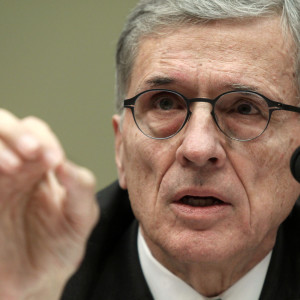Federal Communications Commission Chairman Tom Wheeler plans to push through new rules on privacy, set-top boxes and business broadband before the end of the year. The rules have divided Republicans, Democrats, industry and consumer groups.
During a speech Sunday the FCC chairman said he intends to finish the bold agenda in the last months of 2016, an aggressive timeline Republicans in Congress are wary of as the Obama administration wind to a close and tradition dictates Wheeler step down.
“Other consumer protection items remain in progress, including giving consumers choice in the devices they use to access their pay-tv services, dealing with competitive access to essential last-mile facilities, and protecting consumer privacy rights for network-generated information,” Wheeler told attendees of the Aspen Institute Communication Policy Conference.
“While we intend to complete all these matters before the end of the year,” he continued, “their oversight will, no doubt, be priorities for the next commission.”
Wheeler has been non-committal in answering Republicans’ questions about whether he’ll follow tradition and leave alongside Obama, preferring instead to focus on the bold agenda that peaked with the FCC’s landmark and equally divisive net neutrality rulemaking last year.
The rules banning internet service providers (ISPs) from blocking, throttling or prioritizing web traffic set the stage for the chairman’s remaining proposals, which together would give consumers the choice of buying a set-top box instead of renting one from pay-TV providers, set rates for the prices businesses pay for broadband and compel ISPs to get consumers’ permission before collecting data on their web browsing habits.
Just like net neutrality, the proposed rules have deeply divided the commission along partisan lines, with Wheeler and Democratic Commissioners Mignon Clyburn and Jessica Rosenworcel passing net neutrality, rules to expand phone and internet subsidies for poor Americans and regulations for ISPs moving from copper to digital networks largely without input or compromise with Republican Commissioners Ajit Pai and Michael O’Rielly.
Wheeler acknowledged his partisan administration at the FCC and predicted it will continue.
“I’ve spoken about our decisions to preserve a free and open internet, to modernize outdated programs to bring faster connections and Wi-Fi to schools and help low-income Americans get online, to protect consumer rights as we transition from analog to IP networks, and to enhance 911 reliability,” Wheeler said. “These actions sound like common sense – they are – but all were 3-2 votes at the commission.”
“There are those, of course, who have pledged to undo much of what I have just discussed, if given the opportunity,” he added. “The American people will decide which path to follow; elections do have consequences.”
Not all of those actions have translated to victories in the end. Though a federal court upheld the FCC’s net neutrality order earlier this summer, two other courts recently overturned Wheeler’s efforts to let municipal broadband networks expand outside of their territories to compete with private providers and lower the prices inmates pay to make phone calls from prison.
Critics of Wheeler say both represent a disregard for law and economics that have characterized his tenure at the FCC.
The speech came days before the FCC kicks off the second half of its spectrum incentive auction on Tuesday, when wireless carriers will bid on spectrum resold from TV broadcasters to get the airwaves they need to keep up with Americans’ soaring demand for mobile video streaming and other high-bandwidth services.
Wheeler described the auction as key to his plan to speed up the deployment of 5G the agency voted on last month. While Republican commissioners supported the plan, they’ve urged Wheeler to slow down the auction to ensure the commission addresses technical aspects like interference and spectrum repackaging.
Despite the warning the chairman’s Democratic bloc of commissioners moved ahead with the auction’s 2016 timeline.
“It took three years just to manage our way through the rules that would govern this never-before-tried process,” Wheeler said Sunday. “The auction is now underway.”
Wheeler previously predicted the auction will be “supremely successful,” while the pullout of participants including Sprint have left Republicans less optimistic.

